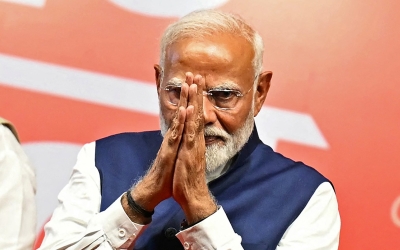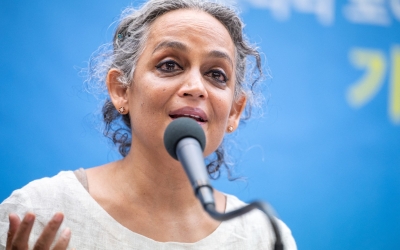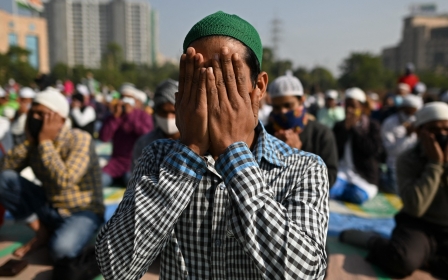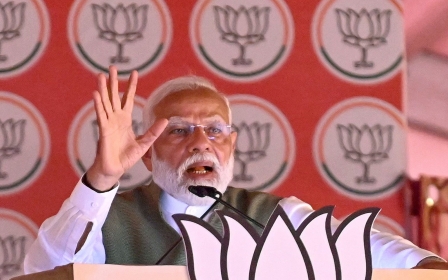India: Why Muslim lynchings continue unabated in Modi's third term
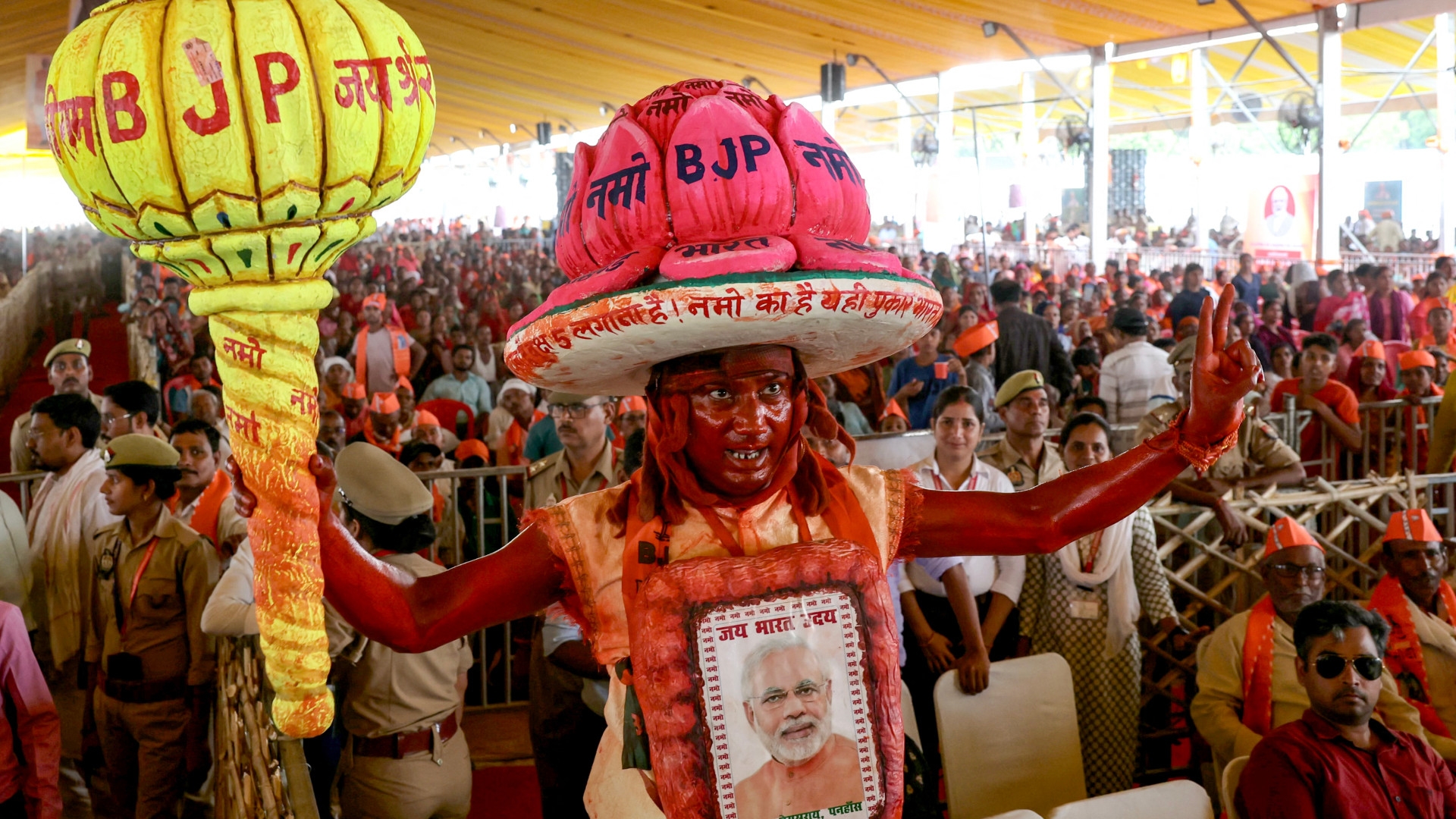
The bubble of optimism that emerged after Indian Prime Minister Narendra Modi failed to secure an outright majority has swiftly evaporated. A palpable sense of fear and insecurity among Muslims over escalating violence, hostility and state persecution has instead prevailed.
Indian Muslims had hoped for a reprieve after the results of parliamentary elections saw Modi's Hindu right-wing Bharatiya Janata Party (BJP) returning to power in a coalition with smaller regional parties, which critics speculated would shackle his Hindu right-wing government from continuing with its communally polarising politics.
There was a belief that the results would lead to a reduction in religiously motivated attacks in the country.
New MEE newsletter: Jerusalem Dispatch
Sign up to get the latest insights and analysis on Israel-Palestine, alongside Turkey Unpacked and other MEE newsletters
Some observers had anticipated a shift in the functioning of Modi's coalition-dependent government. They hoped it would adopt a more inclusive strategy of engaging with minorities, reining in Hindutva forces and fostering a sense of belonging among Muslims.
However, the "silver lining" turned out to be faux positivity as the Modi government now appears to be doubling down on its repressive tactics, with critics contending that the spike in violence against Muslims is vengeance for the recent election results.
Communal violence has also continued unabated. Just days after the results, a series of deadly lynchings, physical assaults, rioting, and demolitions targeting Muslims ensued across different parts of the country, sending a clear signal that Hindutva nationalist groups remain emboldened under Modi's third term.
Spate of lynchings
At least half a dozen incidents of mob lynchings targeting Muslims have been reported in various parts of the country since polling results were announced on 4 June.
On 7 June, two Muslim men were lynched by a Hindu right-wing mob in Chhattisgarh's Raipur in central India over suspected cattle smuggling. A third victim also succumbed to injuries days later.
In India's largest state of Uttar Pradesh, a Muslim man was beaten to death by a mob in Aligarh on 18 June. A video emerged on social media showing individuals armed with lathis, or sticks, cornering and brutalising him. Following the incident, the local BJP officials openly expressed their support for the accused.
Several houses belonging to Muslim men were bulldozed arbitrarily after authorities 'found' beef in their refrigerators
On 22 June, a 23-year-old Muslim man was reportedly beaten to death by a mob during a cricket match in Modi's home state of Gujarat. Two others suffered injuries during the same incident.
Locals claimed tensions had begun even before the match, as a number of the players participating in the tournament were Muslims and had been "playing well", which disturbed a segment of pro-Hindutva sports fans.
The organisers of the cricket tournament had warned of the potential for communal clashes, with Muslim players expressing their fears about taking part in the match.
Two days later, on 24 June, a woman was murdered by Hindu nationalists in the Dantewada district of Chhattisgarh after she and some of her family members had converted to Christianity.
On 30 June, in the eastern state of Jharkhand, a Muslim cleric was lynched by a mob that accused him of hitting a woman on the road.
Manoj Kumar Jha, a senior legislator from the Rashtriya Janata Dal opposition party, expressed his dismay over the violence against Muslims, believing the attacks are punishment for their votes.
Moreover, on 19 July, authorities in Uttar Pradesh directed eateries along the path of an annual Hindu pilgrimage to publish the names of their owners and operators to prevent "confusion" among Hindu devotees.
Opposition leaders compared the move to apartheid in South Africa, claiming that the goal was to ensure that no Hindu would ever purchase anything from a Muslim-owned business.
Further targeting Muslim religious intuitions, the Indian government last week tabled a bill proposing amendments to the Waqf Act of 1995, which gives waqf boards the authority to oversee waqfs (Islamic endowments of property for religious or charitable purposes). The bill would instead make local state officials the arbitrators. It also includes changes to ensure the representation of non-Muslim individuals in central and state waqf bodies.
"You are enemies of Muslims and this bill is evidence of that," All India Majlis-e-Ittehadul Muslimeen party chief Asaduddin Owaisi said in response to the proposed bill, while other opposition MPs called it "a draconian attack" on the Indian Constitution.
Communal violence
As tensions continued to boil over, in India's northernmost state of Himachal Pradesh last month, a Muslim businessman was harassed and his shop vandalised by a Hindutva mob that falsely accused him of slaughtering a cow.
Hindutva groups claimed that the shop owner had allegedly shared a photo of animal sacrifice on his WhatsApp status. After looting and vandalising the shop, the mob then marched to the local authority's office, chanting: "Shoot the traitors."
At least 16 other Muslim shopkeepers were forced to flee the town of Nahan as communal violence erupted following the incident.
In the central Madhya Pradesh state, several houses belonging to Muslim men were bulldozed arbitrarily after authorities "found" beef in their refrigerators. Around 50 people have been left homeless following the demolitions.
In Delhi, at least two mosques were demolished arbitrarily after a Hindutva group ran a hate campaign, calling the facilities "illegal". And clashes erupted in Jammu and Kashmir's Kathua after a contentious demolition of a mosque.
Amnesty International has previously condemned India's use of bulldozers as a form of collective punishment against minority communities and a violation of international human rights law.
The targeted harassment of Muslims significantly escalated around the Eid al-Adha celebrations in mid-June. Mob violence led by Hindutva groups targeting Muslims erupted in various states, including Chhattisgarh, Gujarat, Odisha and Telangana.
On the eve of Eid on 15 June, a clash erupted over the transportation of cows in the South Indian Telangana state, with a number of people injured. An armed mob attacked Muslim residents over cattle brought for slaughtering for the occasion.
There is a prohibition on the slaughter of cows and calves in Telangana. At the same time, oxen and bulls of a certain age or those used for farm activities are protected under the 1977 Prohibition of Cow Slaughter and Animal Preservation Act. Local Muslims asserted, however, that the "animals were bulls and had valid documents that they were fit to be sacrificed".
The mob also attacked a school and targeted Muslim-owned shops and establishments, including a hospital. Local police later arrested several BJP leaders and affiliates in connection with the violence.
Hindu religious festivals have often been weaponised by the BJP government to galvanise voter support, resulting in a rise in communal violence against minorities
On 17 June, a curfew was imposed for over a week after a communal scuffle broke out over allegations of cow slaughter in Balasore, Odisha.
In West Bengal's Birbhum, a 19-year-old Muslim man was assaulted after a mob accused him of throwing a packet of meat in front of a Hindu temple.
There has been a renewed spike in cases of cow vigilantism, with Gau Rakshaks, or cow vigilantes, harassing and assaulting Muslims over the possession, buying, or transportation of beef.
Hindu religious festivals have often been weaponised by the ruling BJP government to galvanise voter support, resulting in a rise in communal violence against minorities.
These Hindutva groups are emboldened by a perceived sense of political patronage, which grants them a degree of impunity and incentives, alongside material support, to organise violence.
Retribution
Amid the ongoing rise in violent attacks, some critics believe the goal is to punish Indian Muslims for voting against the ruling BJP.
According to Apoorvanand Jha, a political commentator and professor, there are a number of political and economic incentives driving Hindutva groups to engage in communal violence, such as being granted positions and leadership roles within the party, receiving support to run on the party ticket during elections, or even erasing Muslim competition in local business dealings.
He further contends that the violence is a reflection of Hindutva forces' anger at not being given the kind of mandate they wanted.
Modi's BJP failed to secure the more than 400 parliamentary seats needed to push through constitutional changes, such as implementing a presidential system that would grant him more expansive powers. "This [frustration] is being taken out on Muslims," Apoorvanand told Indian media outlet The Quint.
The Communist Party of India (Marxist) similarly remarked upon the increase in communal assaults following the electoral setbacks suffered by the BJP, noting that "the BJP and the Hindutva communal forces will intensify their attempts at polarisation with a renewed vengeance".
The targeting of minority communities is likely to continue as action against the mob mentality and communal violence remains elusive. This is especially the case among Hindutva groups emboldened by a decade of BJP rule and against whom political parties, law enforcement agencies and the judiciary remain reluctant to take action, for fear of majoritarian backlash.
The opposition Indian National Developmental Inclusive Alliance coalition and the Congress party, in particular, have been criticised for their deafening silence, with rights activists accusing them of failing to make Muslim persecution a central part of their ideological battle against the BJP.
Owaisi condemned the ruling BJP for winning elections by fomenting "hate against Muslims" and rebuked the opposition, principally the Congress party, for ignoring and silencing Muslims despite the party receiving "over 90 percent of Muslim votes". Muslims are often spoken about and discussed, he said - but they are never heard.
The views expressed in this article belong to the author and do not necessarily reflect the editorial policy of Middle East Eye.
Middle East Eye delivers independent and unrivalled coverage and analysis of the Middle East, North Africa and beyond. To learn more about republishing this content and the associated fees, please fill out this form. More about MEE can be found here.



